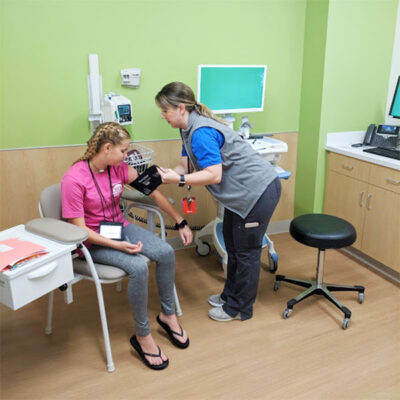Camp 2024
Metabolic Camp is an overnight camp that will take place June 10-15, 2024 at Emory University, with approximately 30-40 campers and 20 staff. All meals will be provided and supplemented with low-protein modified foods. Registered dietitians will be present to assist campers at each meal and throughout their stay.
Camp Components
Nutrition Counseling Groups
Daily nutrition management counseling sessions conducted by medical faculty (registered dietitian) and an assistant (nutrition student).
Large Group Classes
Topics may include nutrition management, genetics, maternal PKU, reproductive health, exercise, and others. Classes are taught in large group setting and in breakout groups.
Small Activity Groups
Themes may include cooking, medical food taste testing, personal wellness, art, and others. Activities are conducted in small group settings.
Social Support
Activities may include walking, swimming, cooperative sports, local field trips, shopping, movie night, dance party, closing dinner and awards ceremony.
Travel & Transportation
- US and International campers attend each year.
- All campers are responsible for their own transportation to and from Atlanta.
- During camp, all local transportation is provided, including ground transportation to and from the Hartsfield-Jackson Atlanta International Airport.
Facilities & Accommodations

Emory University
Metabolic Camp will be held on the campus of Emory University. Campers will have access to campus facilities, such as the Woodruff Physical Education Center, Clairmont Campus Swimming Pool, and Lullwater Park.
Camp Houses
Campers will stay in one of two Camp houses. Each of the Camp houses offers double occupancy rooms with 2 single beds, community bathrooms, lounge area, refrigerator, laundry
Faculty
There will be one medical faculty member and one assistant for every 5-7 campers. The faculty will be involved in helping campers with daily activities.
Clinical Care
 For clinical purposes, all campers are required:
For clinical purposes, all campers are required:
- To provide a filter paper for plasma amino acids on both the first and fifth days of the camp.
In order to monitor diet compliance and to identify areas for improvement, each camper also is asked to:
- Complete 3-day diet records prior to Camp.
- Complete 3-day diet records during Camp.
These are standard patient management procedures and are not considered a part of the research process. To learn more about the option to participate in Camp research, please visit the About Metabolic Camp page.
Camper Packet
Once you have registered, you will receive a registration confirmation and a Camper Packet containing information and forms to complete in preparation for camp week. You will receive access to your camper packet online, unless requested otherwise.
FAQs
I’m in the early stages of planning a pregnancy. Is it too late for me to come to camp?
No, it is a great time for you to come to Camp. Structured low-protein meals, diet education, and monitoring your plasma phenylalanine will help prepare you for getting focused and on track to have an in-control pregnancy.
Is this camp only for girls who want to get pregnant? I don’t think I’ll be planning a pregnancy anytime soon.
This camp is open to all young women with PKU and MSUD, not just those who want to plan a pregnancy. Staying in good control of your diet is important at every stage of your life, and Metabolic Camp is here to provide you with the tools to help you manage your PKU or MSUD.
 I’ve never been around any other girls who have PKU or MSUD. I am shy and don’t like talking about my diet or disorder. Would I fit in okay at camp?
I’ve never been around any other girls who have PKU or MSUD. I am shy and don’t like talking about my diet or disorder. Would I fit in okay at camp?
One of the primary goals of Metabolic Camp is to provide social support and empower our campers to take ownership of their disorder. For the entire week you will be surrounded by peers, dietitians, and other camp staff who create a supportive and understanding environment to learn and grow while creating lasting friendships.
I have been in great control of my diet for most of my life and don’t feel like I need this camp to “get back on track”. Would I still benefit from coming to camp?
Part of the social support aspect of Metabolic Camp is to provide mentorship and peer-to-peer support. Having experienced young women who are in good control is helpful for other campers who may be struggling to stay on diet.
I don’t normally like the taste of low-protein foods so I don’t eat them much. Will this be my only option for food while I’m at camp?
All of the camper meals are prepared with both low-protein modified foods (LPMF) and foods that are naturally low in protein like fruits and vegetables. Our camp chef prepares traditional meals with a combination of these ingredients – so you will have the opportunity to try lots of new things throughout the week. If there are meals that you don’t like, the kitchen staff and your counselor can help to prepare meals that you will enjoy.
What is the benefit of participating in research at camp?
When you choose to participate in research at camp, you are not only gaining new knowledge about yourself, but also contributing to the future of treatment and management strategies for PKU and MSUD. Research that is done now will benefit future generations as well as you as you get older with new monitoring methods, foods and formulas, and ways of understanding the natural history of these disorders.